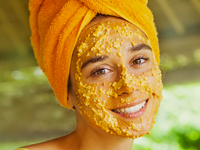


In the race to achieve and fulfil our dreams, we expose our skin to sun and pollution on an everyday basis. Prolonged, unprotected exposure to the sun, dust-infused environment and stress can leave your skin with pigmentation, dryness, dullness, dehydration, breakouts, and wrinkles. How to remove spots from face may have been one of the most popping questions in your head in such times.
To treat your skin, you may have looked up how to remove dark spots from the face or how to remove pimple scars and ended up using steroid-based creams, containing hydroquinone and corticosteroids, to lighten those marks. Continual use of fairness and anti-marks creams containing steroids that have a bleaching effect can leave your skin with various life-long issues.
Although hydroquinone is a bleach dermatologically approved and present as an active ingredient in creams treating skin pigmentation, it is carcinogenic in the long-run and uninterrupted usage can cause skin cancer. The agent decreases the formation of melanin. It has already been banned in countries like Japan, the European Union, UAE, and Australia.
Corticosteroid hormones are naturally produced in the adrenal glands, but topical corticosteroids are synthetic medications used to treat rash, dermatitis, eczema, and psoriasis. Short-term usage effects may include itching, burning, redness, and dryness but use for longer than five months can lead to deterioration of skin cells, skin thinning, widening of blood vessels, life-long sensitivity to sun, bacterial and fungal infections.
Even though Indian dermatologists have been against the sale of topical corticosteroid-containing creams with mild to high potency, they are still sold over-the-counter in pharmacies, often without prescriptions. Two in every five women face mild to extreme side-effects of these steroid-based creams. Dermatologists come across numerous cases of simple skin ailments, but they are becoming increasingly untreatable due to the excessive use of steroid-filled creams by the populace.
People often use such creams to treat pimple marks, dark spots, and pigmentation being oblivious of the ingredients. Steroid-based creams have bleaching agents and chemicals that can peel off the upper layer of your skin. These creams may merely be blocking the UV rays from further tanning your face rather than remedying your skin. Given our country’s geography and sun exposure, it is not possible to avoid tan completely. The need to use these creams is not just physical but often psychosocial, an innate need for acceptance by one and all, whereas the reason should be to take life-long care of your skin for your happiness. To treat and save your skin from the adverse side-effects of steroids; it is time to turn to our Indian roots of ayurvedic treatments.
Ayurveda is infused with plant-based products that protect, cleanse, detoxify, and nourish your skin with purely natural remedies. The treatment consists of oils, herbs, flowers, mud, and butter; makes the skin texture smoother, pigmentation lighter and heals dark circles. A steady and unbroken treatment of skin with Ayurveda accompanied with a healthy diet rich with fruits and vegetables can bring out the natural radiance of the skin.
Ayurvedic creams and masks for different skin types can help you treat specific skin issues. Bajaj Nomarks brings to you all-natural, ayurvedic products that can enhance your natural glow and protect it from dullness caused by pollution. One of the best anti marks creams, Bajaj Nomarks Ayurvedic Antimarks Cream has an advanced 4 step mark reduction action – 1. Soothing, 2. Restoration, 3 Protection, and 4. Prevention. It helps you get rid of scars and blemishes and gives you flawless skin.